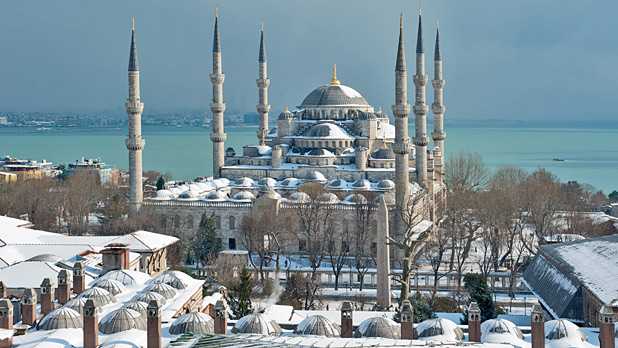If slogans, claims, political rallies, sit-ins, threats and blasts were a contributing factor in the power of a nation, Pakistan would be a superpower. But education results in a better economy and society, and gives greater political and diplomatic clout to the country concerned. Turkey, following the path of education, is going to become the leader of the Muslim world. The thing that made the nation strong is its achievements in the field of education, which is why it is asserting itself in the fields of politics and diplomacy. On the Palestine issue Turkey has challenged Israel, along with the US, and is equally assertive on other international issues.
Turkey is a bridge between Asia and Europe and culturally it is a mix of Islamic and Western traditions. Initially it tried hard to be part of the West; however, its failure in that effort persuaded Turkey to try to be a leader of Asia and the Muslim world. This explains Turkey’s recent proactive approach on the Afghanistan issue. Turkey is no more interested in being a mediator and aims to play a broader and more active role in the region. One example of such intentions is the Istanbul Conference held on November 2.
The Istanbul Conference gave a boost to the existing diplomatic efforts by inviting all regional stakeholders like Afghanistan, Pakistan, Iran, India, China, Russia, the Central Asian states and Saudi Arabia. Its success is evident from the fact that Pakistan and Afghanistan were forced to move closer just one day before the conference. Turkey made it possible for the two countries to agree on a Pak-Afghan Commission. The investigation into the assassination of Burhanuddin Rabbani will be conducted by the intelligence agencies of Pakistan and Afghanistan under the supervision of Turkey. These steps will lessen the apprehensions of Pakistan regarding Indian influence in Afghanistan.
At the conference Afghanistan was described as the heart of Asia and it is asserted that the country would be reconstructed through its becoming a hub of regional economic and commercial transactions. The commission was also established to increase cooperation in numerous areas, including trade, education, agriculture, immigration and anti-terrorist activities.
But the conference failed to provide any roadmap to end the war in Afghanistan or any agreed plan for regional security. How could Afghanistan be converted into a hub of economic activities in the midst of the warlike conditions there? And how could the dream of regional cooperation be turned into reality until such security issues remain? The core problem in Afghanistan is indeed the US, and the complexities of its problem are a result of confused US policies. Thus, any diplomatic effort, the Istanbul Conference included, could not yield any results if it works as a tool for the achievement of US objectives in Afghanistan. Naturally, such efforts by the US would be resisted by China, Iran and Pakistan. The Istanbul Conference was seen as a preparatory effort for the Bonn Conference.
In regional cooperation, one big hurdle is the strains between Pakistan and India. The two neighbouring countries are at extremes in terms of their interests and objectives. In the Istanbul Conference efforts to remove these strains were not very successful. Thus, no agreed security infrastructure could be planned for Afghanistan in the conference.
In the conference I put one question to many Pakistani and Afghan diplomats. I said that Kabul and Islamabad are at just 45 minutes by air and require only five hours’ journey by road, so why do the two counties need Washington or Istanbul for their meetings? The two countries have a long list of complaints against each other, but in private both agree that their issues are getting more complex because of foreign intervention. Afghanistan is a playground for the national strategic objectives of Iran, Saudi Arabia, the US and a number of other Western countries.
How could the very actors who created the problems possibly solve them? Another strange fact that complicates the issue is that most of the actors engaged in the war in Afghanistan are not immediate stakeholders. The Afghanistan issue is not hurting the US, Europe and Russia in the way that it hurts Afghanistan and Pakistan. Any diplomatic solution to the issue needs to be started with the acceptance of Afghanistan and Pakistan as key players and primary stakeholders. Secondary stakeholders may include China, Iran, Russia and the Central Asian states, and these stakeholders should be given a proper role in such efforts. The third layer of stakeholders may include Europe, India, Turkey and others. And at the end of the list comes the US.
Unfortunately, the least concerned nation, the US is always in the driving seat in all diplomatic efforts on Afghanistan. The real solution of the issue lies in a trilateral dialogue between Pakistan, Afghanistan and Turkey. Once Pakistan and Afghanistan are on the same page, all three countries could negotiate with the Taliban. In such negotiations all genuine concerns of the US may also be raised and its safe exit ensured. After that the future of Afghanistan could be addressed, and with the help of regional players the strategic policy that respects the genuine concerns of all regional actors could be finalised. Only such a policy can guarantee the existence of a strong and prosperous Afghanistan.
The writer works for Geo TV. Email: saleem.safi @janggroup.com.pk
via Turkey’s new role – Saleem Safi.
